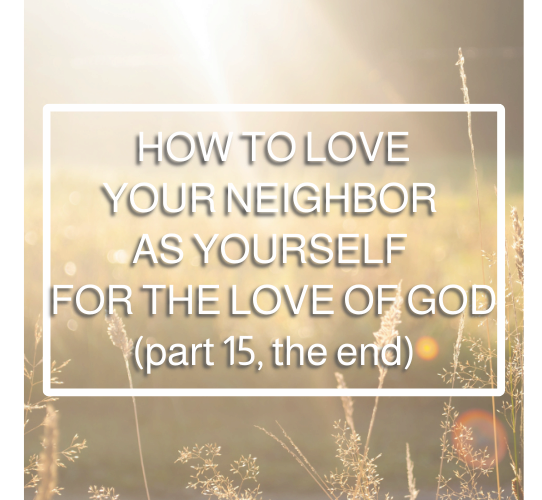In Christ
“Be transformed by the renewal of your mind.” -Romans 12:2
New lives—transformed lives—begin with made-new minds. New Minds: a new view of the world—ourselves and other included—based on different premises, making different observations, drawing different conclusions—the basis for differently motivated actions.
Each of those points could be unpacked. Let’s do so briefly.
Have you ever noticed that people tend to notice different things—“That picture is crooked… this needs more salt…”? Why do we notice what we notice? It is because we value certain things. One person notices the lack of salt, and another shrugs and keeps eating. Our premises are different—what we think is good, admirable, and excellent. But then, our attentions accumulate. Our premises are involved in data-acquisition, and then all that data becomes a conclusion. “The World is…!” “People are…!” “I’ll always be…!” “You’ll never…!” Conclusions are powerful! They form the theological and philosophical framework from which we live and move and have our being.
And so it is very, very important that the Gospel is our mental starting place. What’s the most important thing about the world? That it was made good by a good God. What’s the most important thing about people? That the Father created them, loves them and has worked a plan to redeem them. What’s the most important thing about God? That He is revealed in Christ. What is the most important thing about you? The nature of your relationship with God in Christ: you are a child of God, if you are Christ’s. (There is no time these questions are unimportant, but during shakey-seasons of flux and fear they become super-important. "Covid-19" isn't just trying to infiltrate our bodies, but our minds as well. How's your mental health? It's a struggle, right? Well, tally ho!)
Paul, in the book of Romans, lays some heavy-business on us. But he distills all of his thorough, careful, and sometimes complicated logic for us in chapter six. There he draws his premises and observations to a conclusion—a conclusion we must recognizes and receive if we are going to stop living for our sinful, foolish, passions and live instead with God.
“So you must consider yourselves dead to sin and alive to God in Christ Jesus.” (Romans 6:11)
This is the first command in Romans. It is the critical turning point in Paul’s argument—here he pivots from deep reflection on the Gospel to deep reflection on the practical effects of the Gospel.
So, today, what does it mean to “consider yourself… in Christ Jesus”?
In context, Paul says that “we have been united with Jesus in a death like His, we shall certainly be united with Him in a resurrection like His.” (v. 6) And, “if we have died with Christ, we believe that we will also live with Him.” (v. 8)
The most important thing about who you are now is defined by your relationship with Jesus. You are united with Him—in His death on the cross and in His eternal life sprung from the Easter-tomb. What is most important about Jesus is what is most important about you. He died; you died. He lives; you live.
It means, therefore, do not consider yourself—do not think of yourself—separate from your relationship to Jesus. That is who you truly are. If you think of yourself primarily as your job, your role in relationships, your personality, your interests and hobbies, your sins, your worst mistakes or your highest aspirations, you are not thinking of yourself as you ought to think.
When you think of you who you are, the most true, the most foundational, the least changeable thing, is that you are in Christ, united with Him, in a way that you are not “in” or “united with” anything or anyone else.
“In” is a location word. It’s where you are. It locates. Where are you? You’re in… a person. Jesus is your identity. You are not Jesus, no, but “you”—you are you—is located within Him, so that who you-yourself are must be known and seen and lived-out through Christ.
We can draw comparisons to help us understand this, but they will be a little off, for none of them will be as lovely, true, and lively as Christ.
So, for example, when someone joins the military—I mean really joins the military—everything about them screams “Military!” Haircut, “Yes, Ma’am,” sock drawer, posture, wardrobe, eye-movement… Now, they didn’t “start” that way. But who they are has been inserted into the military, so that who they are comes to us in military fashion. You could imagine a parent saying, “I know who you really are!” But all they mean is that they remember what their child was like as a child: to know the child now is to know them embedded in a military-identity. That’s an example of our location in Christ, but using the military as an identity-location, rather than a real person.
To think about this regarding persons we begin to descend into some less pleasant ideas. For example, a child goes away to college—they’re into sports and getting good grades and want to be a lawyer—and then they come home with a boyfriend or girlfriend and they’re into The Grateful Dead and skateboarding and botany. And all these happen to be the special interests of their new friend. They haven’t become the other person, but the way they want the world to know them is mediated through this new “persona.” Of course this seems unhealthy—and maybe it is, but also maybe the lawyer-dream was your dream and the botany interest was there all along? Whatever. The point is that here is an example of a self made new—the kid is still in there, but now is mediated to the world through the values, interests, and ideals of this other person. Again, kind-of ick.
So no where near as lovely, true, lively, and good as what the Father brings us into when we are “in Christ.” Because Christ is actually our true identity—it was in His image we each were made! And the Father is our true Maker—He will never corrupt us, only ever restore us. And the Spirit is the true Creator, only ever bringing us back to… ourselves.
But through these examples we can see a little bit of what it means to be “in Christ.” We are still ourselves—you are still you—but everything about us screams at one and the same time, “Me!” and, “Jesus!” (Or, that’s what discipleship is aiming at.)
This is the fundamental, the first, shift that must take place in our minds. We must stop thinking of ourselves as only-ourselves. The Christian life is not a “choose your own adventure” story where “the self” can be discovered or defined however we see fit. The Christian life begins with a renewal of our minds, specifically on the subject of who we are really are, now. Discovery and redefinition: new minds with which to make better judgments, loving decisions, and wise plans.
It is very, very important that the Gospel is our mental starting place.
Finding ourselves firmly located—“stuck”—in Christ is the first step to getting unstuck from the identity-bologna that may have been keeping us swirling around the drain for some time now.
The Bible tells us to consider ourselves in Christ Jesus. Perhaps if we don’t consider ourselves in that way, no one else will. But what would you say you’re most “in” these days? A role? A relationship? A persona? A job or hobby or character trait? An anxiety? A preoccupation?
May the Peace of Christ rule in the kingdom of your heart. May the Word of Christ’s victory dwell in you with rich effects. So may you consider yourself, first and foremost, in Christ. Amen.
We need and want transformed lives.
We need, therefore, new minds: premises, observations, and conclusions.
We need the Gospel to be where our minds start.
Father, we hear in Romans 12:2 the hope and the promise of transformation. While we are in no way wholeheartedly enthusiastic about this idea, we are also excited to see more of Christ in our lives. And so we ask you to give us new minds—the mind of Christ. We want to know who You are, who Christ is, what you have done for us in Him, and what this means for us today. We want to start all of our mental-processes with Jesus. We don’t want to look at things the same way the world does, do things the way the world does, and end up where the world leads. We want to live in Jesus, like Jesus, for Jesus. In His Name we pray…











